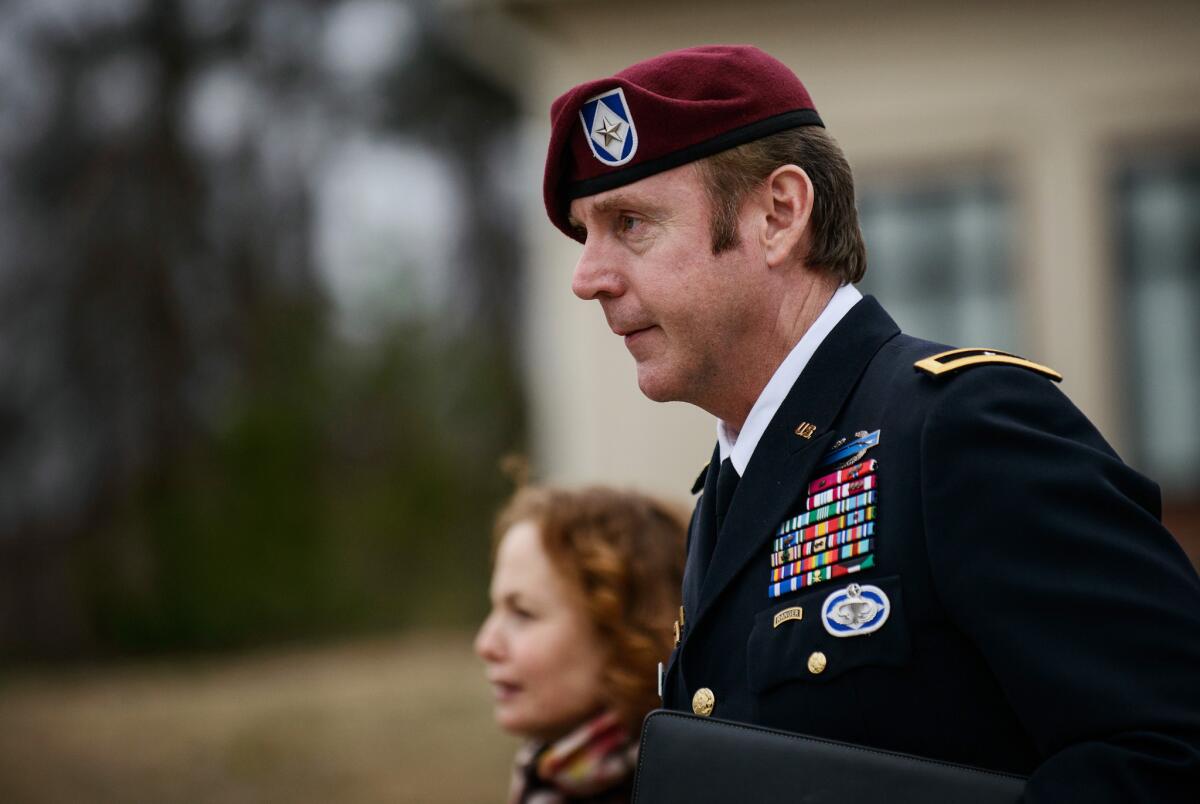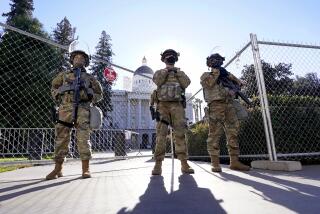Judge refuses to dismiss sexual assault charges against general

FT. BRAGG, N.C. — A military judge refused Tuesday to dismiss sexual assault charges against a one-star general, rejecting defense allegations that the Army has unfairly prosecuted the case in response to political pressure to crack down on sexual abuse in the ranks.
The ruling came after searing testimony about the emotional breakdown last month of the then-lead military prosecutor, described as irrational and suicidal in the days before he quit the case. Lawyers for Brig. Gen. Jeffrey Sinclair had cited comments by the former prosecutor, Lt. Col. William Helixon, in alleging “unlawful command influence” by the Army chain of command.
Helixon was described in testimony by a fellow military legal officer as “crying, irrational, incoherent” and a “functional alcoholic” holed up in a Washington, D.C., luxury hotel on the weekend of Feb. 8 and 9. Brig. Gen. Paul Wilson, a senior Army legal officer at the Pentagon, said he took Helixon to a military hospital in Virginia because he appeared suicidal.
“I’ve never seen a human being so stripped of logic and rationality,” Wilson testified, adding that he feared Helixon would deliberately step in front of a bus.
In seeking the dismissal, Sinclair’s lawyer has cited a one-hour phone call from Helixon on Feb. 9, in which he allegedly expressed serious misgivings about the Army’s handling of the case. Defense lawyer Richard L. Scheff said Helixon concluded that a female captain who accused Sinclair of forced oral sex had lied on the stand and that the general was not guilty of sexual assault.
Sinclair, 51, is charged with forcing a female captain to twice perform oral sex after she allegedly tried to break off their three-year affair, and threatening to kill her and her family if she revealed the affair. The charges are based on statements by the accuser, a captain who was 29 when the relationship began.
In addition to testimony from military lawyers about Helixon, the current lead prosecutor cross-examined Sinclair’s lawyer. At issue was what Helixon may have said about unlawful command influence and the accuser’s credibility — and whether that was relevant to how the Army prosecuted the case.
The judge, Col. James L. Pohl, ruled that the defense had not proved unlawful command influence in the Army’s rejection of Sinclair’s offer to plead guilty to adultery and conduct unbecoming an officer. Merely rejecting the plea was not evidence of improper command or political interference, Pohl said.
However, the judge said a memo from the accuser’s special victim lawyer to a three-star general who turned down the plea offer was “inappropriate” and “does cause concern.’’
The victim’s advocate, Capt. Cassie L. Fowler, wrote to the three-star general that accepting Sinclair’s plea would “have an adverse affect on my client and the Army’s fight against sexual assault.”
Sinclair’s case has played out at a time of heightened political and public concern about sexual assault in the military – and the role of commanders in deciding whether to bring charges. He faces life in prison if convicted on all charges.
The day’s testimony detailed weeks of furious back-and-forth negotiations in a highly publicized case. Lawyers from both sides described the internal dynamics of a rare court-martial of an active-duty general.
Scheff was questioned by his co-counsel and cross-examined by lead prosecutor Lt. Col. Robert Stelle. Two top Army legal officers were cross-examined by the defense team.
The prosecution framed Helixon’s comments as those of a man in severe emotional distress because of concerns about his father’s health, marital issues, his own drinking and pressures of the case. The defense portrayed Helixon as ethically bound to quit a case he concluded was built on politically motivated charges.
Scheff testified that Helixon told him that the prosecution was “driven by politics” and that everyone on the prosecution team had grave doubts about proving the most serious charges against Sinclair. He said Helixon refused to stay on the case unless those charges were dropped.
Stelle said Helixon had tactical concerns about proving the sexual assault charges beyond a reasonable doubt. But he said such concerns are common in “he said, she said” sexual assault cases like Sinclair’s.
Stelle argued that any comments by Helixon were his personal opinions.
“No offense to Lt. Col. Helixon, I don’t really care what he thinks,” Stelle told the judge. “Who cares? Counsels talk about cases all the time. That’s what we do.”
A prosecution witness, Lt. Col. Jerrett Dunlap, the top legal officer at Ft. Bragg, testified that no one on the prosecution team received pressure or undue influence from the chain of command. He said there were no concerns among prosecutors over charges against Sinclair not holding up in court.
Wilson said he rushed to the Ritz-Carlton Hotel when told that Helixon was drinking and acting irrationally.
Wilson said Helixon was distraught over January testimony by the accuser; forensic experts concluded that she lied on the stand about a cellphone containing messages from Sinclair. The accuser testified that she belatedly found the phone in December while unpacking boxes from Afghanistan.
Prosecutors said that although Helixon had concerns about the accuser’s phone testimony, neither he nor any other prosecutor doubted that she was telling the truth about the sexual assault. The captain testified in pretrial hearings that Sinclair grabbed her hair and forced her head down while demanding oral sex when both served in Afghanistan.
Wilson testified that Helixon said of the accuser’s cellphone statements: “She lied to me.... Why would she lie to me?”
Asked by Scheff whether he ever called Sinclair “the poster child for sexual assault,” Wilson said he didn’t recall. Asked whether he agreed with Helixon that the accuser had lied about the phone, he said he was not familiar with her testimony.
“I was concerned about saving a human being,” he said of Helixon.
Questioned by Stelle, Wilson said, “Frankly, I would’ve told him anything to get him into my car” to reach a hospital for mental health counseling. Wilson said he told Helixon’s superior that he was in no condition to remain on the case.
“He was absolutely not fit for any kind of duty. I wouldn’t let him drive a car,’’ Wilson said.
Pohl signaled earlier Tuesday that he was unconvinced by defense allegations of unlawful command influence. When defense lawyer Lathrop Nelson said Helixon had “concluded that this case was infected by politics,” the judge shot back, “That’s just his opinion.”
Afterward, Scheff said the prosecution “undertook a vicious character assault against someone they previously called their `rock star’ sex crimes prosecutor, because he was the only Army leader with the integrity to stand up to politics.’’
The court-martial resumes Wednesday with questioning of the five-member jury panel, composed of generals senior in rank to Sinclair. Opening arguments are expected Thursday.
In addition to sexual assault and sodomy, Sinclair is charged with adultery, pressuring two other female officers to send him nude photos, possessing pornography and abusing his government charge card to pursue liaisons with the captain
Charges of possessing alcohol in a war zone were dropped. The defense said Sinclair had received a gift bottle of liquor but had never cracked the seal.
ALSO:
Son who helped father fake drowning gets jail time in scam
Body found in rubble of New Jersey condo gas explosion; 7 injured
New York Times corrects 1853 story about subject of ’12 Years a Slave’
Twitter: @davidzucchino
More to Read
Sign up for Essential California
The most important California stories and recommendations in your inbox every morning.
You may occasionally receive promotional content from the Los Angeles Times.











